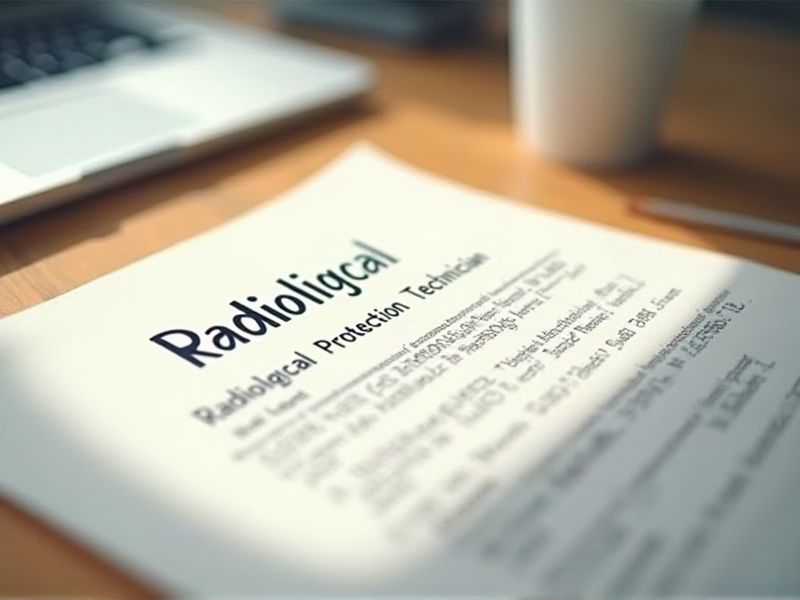
Radiological Protection Technicians operate in environments with potential exposure to hazardous radioactive materials, increasing the necessity for specific certifications. These certifications ensure that technicians have the essential knowledge and skills to implement safety protocols effectively, minimizing radiation risks to themselves and others. Regulatory bodies and employers require these credentials to maintain industry standards and public safety. Key certifications for a Radiological Protection Technician include those that validate competency in radiation detection, measurement, and safety procedures.
Radiation Safety Officer (RSO) Certification
RSO certification ensures that a Radiological Protection Technician possesses the necessary knowledge to implement safety protocols effectively, minimizing the risk of radiation exposure. Certification provides standardized training that equips technicians with the skills to handle radiological materials safely. An RSO-certified technician is more likely to comply with regulatory requirements, reducing the likelihood of legal or safety violations. Employers often require RSO certification to demonstrate a commitment to workplace safety and to meet industry standards.
Certified Health Physicist (CHP) Credential
The Certified Health Physicist (CHP) credential provides radiological protection technicians with a standardized recognition of expertise, ensuring they meet rigorous professional standards. Achieving this credential enhances a technician's credibility and trustworthiness in managing radiation safety protocols. Employers are likely to favor candidates with CHP certification due to their proven knowledge in safeguarding environments from radiological risks. The credential encourages ongoing education, enabling technicians to stay updated with current methodologies and regulations in radiological protection.
Radiological Control Technician (RCT) Certification
Radiological Control Technician (RCT) Certification ensures that individuals possess the required knowledge and skills to handle radioactive materials safely, reducing the risk of radiation exposure. Regulatory bodies mandate this certification to ensure uniform safety standards across facilities handling hazardous materials. Employers seek RCT-certified technicians to maintain compliance with federal and state regulations pertaining to radiation safety. This certification enhances the trust and confidence of both employers and the public in the technician's ability to manage radiological hazards effectively.
Basic Radiation Safety Training Certificate
Possessing a Basic Radiation Safety Training Certificate ensures a Radiological Protection Technician has foundational knowledge in safely handling radiological materials, which reduces the risk of harmful exposure. This certification demonstrates the technician's understanding of regulatory requirements and compliance standards set by health and safety authorities. It equips technicians with the ability to implement effective radiation protection measures, minimizing potential hazards. Employers rely on such certification to verify that technicians are capable of maintaining a safe environment for both workers and the public.
Ionizing Radiation Safety Technician (IRST) Certification
IRST Certification enhances the skill set of Radiological Protection Technicians by providing specialized knowledge on handling ionizing radiation safely. With this certification, technicians can better implement safety protocols, reducing the risk of radiation exposure in workplaces. Regulatory compliance is another reason, as certification often aligns with legal requirements for radiation safety roles. Organizations also prefer certified technicians to ensure that industry standards and best practices are consistently met in radiological environments.
Nuclear Regulatory Commission (NRC) Compliance Training Certificate
The NRC Compliance Training Certificate ensures that a Radiological Protection Technician is knowledgeable about current nuclear safety standards and regulations. This certification provides proof of competency in handling radiological materials safely, minimizing the risk of accidents. Compliance with NRC standards is mandatory for legal operation in the nuclear industry, safeguarding both workers and the public. Accredited training enhances a technician's career prospects by demonstrating commitment to industry best practices.
Hazardous Materials (HazMat) Technician Certification
The HazMat Technician Certification equips Radiological Protection Technicians with the necessary skills to safely handle and mitigate incidents involving hazardous materials. Radiological environments often contain materials that can pose serious health risks, making specialized training essential for effective incident response and containment. Certified technicians are more proficient in using protective equipment and decontamination procedures, reducing exposure risks. Certification ensures compliance with legal and safety standards, critical for maintaining workplace safety and public trust.
Occupational Safety and Health Administration (OSHA) 30-Hour Training Certification
Radiological Protection Technicians work in environments where exposure to radioactive materials can pose significant health risks, necessitating strict adherence to safety protocols. The OSHA 30-Hour Training Certification provides comprehensive education on occupational safety and health standards, which is critical in mitigating such hazards. With this certification, technicians gain a deeper understanding of regulatory requirements and best practices, enhancing their ability to maintain a safe working environment. Employers often require this certification to ensure compliance with legal standards and to protect both employees and the facility from potential radiological incidents.
Emergency Response Radiological Incident Management Certification
Emergency Response Radiological Incident Management Certification ensures that Radiological Protection Technicians are equipped to handle radiological emergencies effectively. Radiological incidents require specialized knowledge to mitigate risks and protect public health. Certified technicians can implement proper protocols, minimizing potential contamination and exposure. Regulatory bodies often mandate such certification to comply with safety standards and guidelines.
CPR and First Aid Certification
Radiological Protection Technicians often work in environments where potential accidents can lead to respiratory or cardiac distress, necessitating CPR skills to respond effectively and minimize harm. Handling radiological materials can result in unexpected injuries, making First Aid Certification essential for immediate injury management and ensuring workplace safety. CPR knowledge among technicians improves the overall emergency preparedness of radiological facilities, ensuring timely intervention that can save lives. Possessing CPR and First Aid Certification aligns with occupational safety standards and regulations, enhancing both personal and public safety in radiological contexts.
Summary
When you earn certifications as a Radiological Protection Technician, you deepen your knowledge and expertise in radiation safety protocols. This specialized training can enhance your employability and potentially lead to career advancement opportunities. Certification often results in increased trust from colleagues and employers, as it signifies a higher standard of professional competence. Employers may also offer higher compensation to certified technicians due to their validated skills and reliability.
